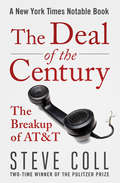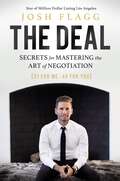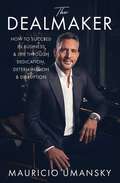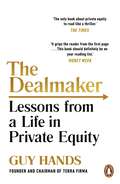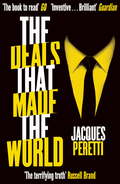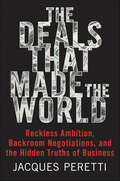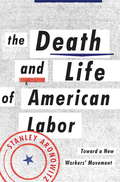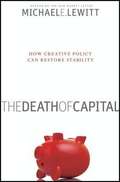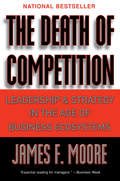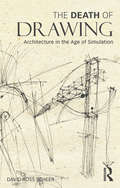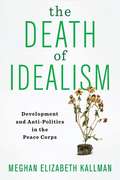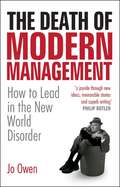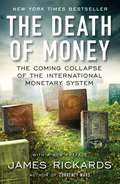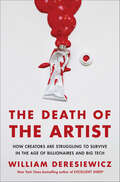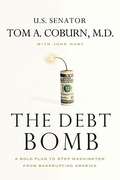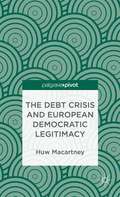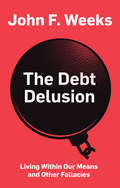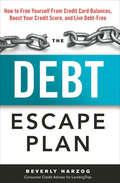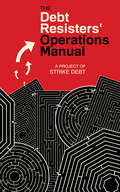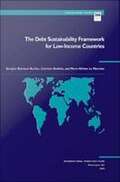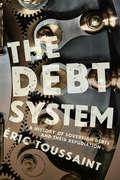- Table View
- List View
The Deal of the Century: The Breakup of AT&T
by Steve CollA New York Times–bestselling author&’s &“superbly reported&” account of the dismantling of the world&’s largest corporation (The Washington Post). Written by the two-time Pulitzer Prize–winning author of Ghost Wars and Private Empire, The Deal of the Century chronicles the decade-long war for control of AT&T. When the US Department of Justice brought an antitrust lawsuit against AT&T in 1974, the telecommunications giant held a monopoly on phone service throughout the country. Over the following decade, an army of lawyers, executives, politicians, and judges spent countless hours clashing over what amounted to the biggest corporate breakup in American history. From boardroom to courtroom, Steve Coll untangles the myriad threads of this complex and critical case and gives readers &“an excellent behind-the-scenes look&” at the human drama involved in the remaking of an entire industry (The Philadelphia Inquirer). Hailed by the New York Times Book Review as &“rich, intricate and convincing,&” The Deal of the Century is the definitive narrative of a momentous turning point in the way America does business.
The Deal-Making Mind-set: Why "Yes" Is Often Not Enough
by Danny Ertel Mark GordonThis chapter examines common mistakes made during negotiation and provides individuals and organizations with the self-reflective questions essential to getting beyond "yes."
The Deal: Secrets for Mastering the Art of Negotiation
by Josh FlaggLEARN STRATAGIES FOR SUCCESSFUL DEAL MAKINGStar of the hit show Million Dollar Listing Los Angeles, Josh Flagg shares his secrets to mastering any negotiation in any industry and at any level.Throughout his career, Josh Flagg has faced off with challengers of all kinds in negotiations over the world&’s most expensive and sought-after real estate. He has seen and put into practice what works and identified the &“common tricks&” that don&’t. Josh has curated ten rules that, when applied to any deal, will significantly increase your chance of success, and make you the master negotiator your clients need you to be. Sample rules include:Rule #1: Don&’t Sell Garbage- you are what you sell.Rule #2: You Only Have One Client- focus on the one you&’re with.Rule #3: Up Your Attitude- be the person people want to represent them.Rule #8: Play the Psychologist- you are your client&’s best friend.Rule #10: Know Your Worth- you are your best advocate.If you want to be the best, you have to look and act like the best. Josh learned this rule young and has applied it to every client relationship he has ever had. He began his real estate career as a student at Beverly Hills High School—swung big and hit—landing him in the perfect position to take on some of LA&’s largest, most exclusive real estate listings and, eventually, a spot on Million Dollar Listing Los Angeles. Apply the lessons in the book to become the negotiator who closes million-dollar deals.
The Dealmaker: How to Succeed in Business & Life Through Dedication, Determination & Disruption
by Mauricio UmanskyMauricio Umansky, real estate mogul, longtime fan favorite of The Real Housewives of Beverly Hills, and star of his own Netflix series Buying Beverly Hills inspires budding entrepreneurs and self-starters of all backgrounds with tips and strategies to find success at work and at home. After more than twenty years in the cutthroat real estate business, Mauricio Umansky has seen and heard it all. Now, he&’s ready to share everything he&’s learned throughout the highs and lows of his illustrious career in this part memoir, part leadership manifesto. From the challenges of his childhood to outgrowing his father&’s textile company and falling out with his brother-in-law Rick Hilton, while also raising a family and maintaining a strong marriage for over twenty-five years, Umansky has plenty of advice and lessons for aspiring entrepreneurs and self-starters across all industries. By outlining his fundamental principles of success, Umansky will embolden those who are ready to work hard and are prepared to meet adversity head on, which requires endless stamina, grit, and determination. Each chapter will center around a specific piece of wisdom and offer insightful takeaways including: How to Play Hard and Work Harder, How to Find Your Professional and Personal Passions, How to be an Innovator Not an Imitator, The Art of the Sell, The Benefits of Remaining Positive, How to Achieve Balance, and so much more. Umansky&’s journey has been anything but boring. It&’s been unpredictable, exhilarating, and emotionally and physically demanding at times. In The Dealmaker, he imparts his hard-earned knowledge, along with strategies he&’s taught himself, for anyone and everyone looking to build their own fruitful career and to find the happiness we all seek in life. Welcome to his exclusive and exciting world.
The Dealmaker: Lessons from a Life in Private Equity
by Guy HandsAn inside account of the multi-billion pound world of private equity and a masterclass on the art of deal-making.The Dealmaker is a frank and honest account of how a severely dyslexic child who struggled at school went on to graduate from Oxford and become a serial entrepreneur. It describes Guy Hand's career in private equity, first at Nomura and then as head of his own company, Terra Firma. It looks in detail at the huge deals that Terra Firma has done over the years, involving everything from cinema chains and pubs to waste management, aircraft leasing and green energy. And it offers a brutally honest appraisal of the deal that almost bankrupted him - the acquisition of multinational music recording and publishing company EMI in 2007, just as a global financial crash loomed on the horizon. Above all, he gives the reader a real sense of what it's like inside the secretive world of private equity, describing in frank detail the pressures and rewards involved. Insightful and page-turning, The Dealmaker will prove inspirational and essential reading for all those who want to understand how huge business negotiations are done, and what makes one of private equity's biggest players tick.
The Deals that Made the World
by Jacques Peretti'The book to read' GQ'A revelatory book' John Lewis-StempelWhile the laws that guide our lives are written by the politicians we elect, much of the world around us - from the food we eat to the products we buy to the medications we take - is shaped by private negotiations and business deals few of us know about.For twenty years, Peretti has interviewed the people behind the decisions that have altered our world, from CEOs of multinational corporations to politicians, economists, and scientists. In The Deals that Made the World, Peretti draws on his vast knowledge to reveal a host of fascinating and startling connections, from how Wall Street's actions on food commodities helped spark the Arab Spring to the link between the AIDS epidemic in 1980s San Francisco and the subprime mortgage crisis of 2008. He proves a sure guide, combining both eye-opening on-the-ground reporting and a narrative flair that makes esoteric financial and business concepts clear and understandable.Like Steven Levitt, Nassim Nicholas Taleb, Brad Stone, Michael Lewis, and Malcolm Gladwell, Peretti takes the ordinary and turns it inside out to give us a compelling new perspective on our lives and our world.
The Deals that Made the World: Reckless Ambition, Backroom Negotiations, and the Hidden Truths of Business
by Jacques Peretti"Excellent. ... Impressive." —Financial TimesAn award-winning investigative journalist takes us inside the ten business deals that have transformed the modern worldWe tend to think of our world as controlled by forces we basically understand, primarily the politicians we elect. But in The Deals That Made the World, Jacques Peretti makes a provocative and quite different argument: much of the world around us—from the food we eat to teh products we buy to the medications we take—is shaped by private negotiations and business deals few of us know about.The Deals That Made the World takes us inside the sphere of these powerful players, examining ten groundbreaking business deals that have transformed our modern economy. Peretti reveals how corporate executives engineered an entire diet industry built on failure; how PayPal conquered online payments (and the specific behavioral science that underpins its success); and how pharmaceutical executives concocted a plan to successfully market medications to healthy people.For twenty years, Peretti has interviewed the people behind the decisions that have altered our world, from the CEOs of multinational corporations to politicians, economists, and scientists. Drawing on his vast knowledge, Peretti reveals a host of fascinating and startling connections, from how Wall Street's actions on food commodities helped spark the Arab Spring to the link between the AIDS epidemic in 1980s San Francisco and the subprime mortgage crisis of 2008. Touching upon tech, finance, artificial intelligence, and the other levers of power in a postglobalization environment, Peretti offers a compelling way to understand the last hundred years—and a suggestion of what the next hundred might hold.An essential book for anyone seeking to understand the hidden forces that shape our modern economy, The Deals That Made the World is illuminating and surprising—and an immensely fun read.
The Death and Life of American Labor
by Stanley AronowitzUnion membership in the United States has fallen below 11 percent, the lowest rate since before the New Deal. Labor activist and scholar of the American labor movement Stanley Aronowitz argues that the movement as we have known it for the last 100 years is effectively dead. And he explains how this death has been a long time coming--the organizing and political principles adopted by U.S. unions at mid-century have taken a terrible toll. In the 1950s, Aronowitz was a factory metalworker.In the '50s and '60s, he directed organizing with the Amalgamated Clothing Workers and the Oil, Chemical and Atomic Workers. In 1963, he coordinated the labor participation for the March on Washington for Jobs and Freedom. Ten years later, the publication of his book False Promises: The Shaping of American Working Class Consciousness was a landmark in the study of the U.S. working-class and workers' movements.Aronowitz draws on this long personal history, reflecting on his continuing involvement in labor organizing, with groups such as the Professional Staff Congress of the City University. He brings a historian's understanding of American workers' struggles in taking the long view of the labor movement. Then, in a survey of current initiatives, strikes, organizations, and allies, Aronowitz analyzes the possibilities of labor's rebirth, and sets out a program for a new, broad, radical workers' movement.
The Death of Capital
by Michael E. LewittIn The Death of Capital, respected portfolio manager and longtime investment professional Michael Lewitt looks at how the U.S. economy has increasingly been dominated by short-term speculation rather than industrial expansion in recent years. These disastrous trends, described here as financialization, ignore the fact that capital itself is a highly unstable process rather than a fixed object or category. As a result of our failure to understand the true nature of capital, we have developed a financial and regulatory system that does exactly the opposite of what it should be doing--favoring obscurity over transparency and fomenting instability rather than growth.In explaining where we have gone wrong Lewitt pulls few punches in criticizing some of the counterproductive forces that have led to the death of capital--including Wall Street practices such as private equity and derivatives trading--which he views both as economically unproductive and morally misguided. Page by informative page, this timely guide:Addresses "financialization" and its consequences, such as a weaker U.S. dollar, the destruction of American industries, and the loss of American economic and political influenceExplores the most important aspects of capital and capitalism through the prism of four of the world's great economic thinkersDiscusses how the legal system aided economic weakening by privileging short-term investment goalsCalls for politically controversial reforms such as stricter regulation of hedge funds and private equity firms, banning naked credit default swaps and Structured Investment Vehicles, and principles-based reforms to improve systemic stabilityFinancial reform is needed to make sure capital does not die again. Filled with in-depth insights and practical advice, The Death of Capital is not just a play-by-play of the recent financial crisis, but an original and passionate analysis of the trends that led to it and what can be done in a regulatory sense to address the problems.
The Death of Competition: Leadership and Strategy in the Age of Business Ecosystems
by James F. MooreToday's marketplace is seeing radical changes in the way companies do business with one another. New partnerships and alliances are constantly being forged, the lines between industries have blurred, and it has become difficult to tell one business from another, and who's competing with whom. The Death of Competition helps managers make sense of this chaos. Using biological ecology as a metaphor, it reveals how today's business environment parallels the natural world, and how, just like organisms in nature, companies must coexist and coevolve within their own business ecosystems. Through numerous examples, he explains the radically new cooperative/competitive relationships like the one forged between IBM and Microsoft and provides a comprehensive framework businesses can use to enhance their own collaborations with their customers, suppliers, investors and communities.
The Death of Drawing: Architecture in the Age of Simulation
by David Ross ScheerThe Death of Drawing explores the causes and effects of the epochal shift from drawing to computation as the chief design and communication medium in architecture. Drawing both framed the thinking of architects and organized the design and construction process to place architects at its center. Its displacement by building information modeling (BIM) and computational design recasts both the terms in which architects think and their role in building production. Author David Ross Scheer explains that, whereas drawing allowed architects to represent ideas in form, BIM and computational design simulate experience, making building behavior or performance the primary object of design. The author explores many ways in which this displacement is affecting architecture: the dominance of performance criteria in the evaluation of design decisions; the blurring of the separation of design and construction; the undermining of architects’ authority over their projects by automated information sharing; the elimination of the human body as the common foundation of design and experience; the transformation of the meaning of geometry when it is performed by computers; the changing nature of design when it requires computation or is done by a digitally-enabled collaboration. Throughout the book, Scheer examines both the theoretical bases and the practical consequences of these changes. The Death of Drawing is a clear-eyed account of the reasons for and consequences of the displacement of drawing by computational media in architecture. Its aim is to give architects the ability to assess the impact of digital media on their own work and to see both the challenges and opportunities of this historic moment in the history of their discipline.
The Death of Idealism: Development and Anti-Politics in the Peace Corps
by Meghan Elizabeth KallmanPeace Corps volunteers seem to exemplify the desire to make the world a better place. Yet despite being one of history’s clearest cases of organized idealism, the Peace Corps has, in practice, ended up cultivating very different outcomes among its volunteers. By the time they return from the Peace Corps, volunteers exhibit surprising shifts in their political and professional consciousness. Rather than developing a systemic perspective on development and poverty, they tend instead to focus on individual behavior; they see professions as the only legitimate source of political and social power. They have lost their idealism, and their convictions and beliefs have been reshaped along the way.The Death of Idealism uses the case of the Peace Corps to explain why and how participation in a bureaucratic organization changes people’s ideals and politics. Meghan Elizabeth Kallman offers an innovative institutional analysis of the role of idealism in development organizations. She details the combination of social forces and organizational pressures that depoliticizes Peace Corps volunteers, channels their idealism toward professionalization, and leads to cynicism or disengagement. Kallman sheds light on the structural reasons for the persistent failure of development organizations and the consequences for the people involved. Based on interviews with over 140 current and returned Peace Corps volunteers, field observations, and a large-scale survey, this deeply researched, theoretically rigorous book offers a novel perspective on how people lose their idealism, and why that matters.
The Death of Modern Management
by Jo OwenWe are at the start of a new wave of management. The recent financial crisis highlighted problems not just in the economic system, but also in the way that many companies are governed and managed. Now modern management has reached its end game and we approach a new era in leadership. Rather than the certainties of command and control, this new epoch will be based on co-operation and commitment. There has been a strategic revolution - instead of following the rules, we now have to make them. For some this represents great risk; for others it is an enormous opportunity. The Death of Modern Management is a how-to guide for surviving and thriving amidst the new uncertainties of contemporary business. ". . . a joyride through new ideas, memorable stories and superb writing. " Philip Kotler "Jo Owen gives a fascinating insight into how 21st century management now works. It is helpful to have someone with his experience, intellect and vision explain the radical changes in a way that makes sense and is immediately usable. " Juliet Hope, CEO, Startup "Jo Owen delivers a robust and wide-ranging assault on the delusions of management, strategy, finance and marketing that have created an aura of justified mistrust around the modern corporation, but does so with wit, lucidity and lots of enlivening illustrations. The answers for 21st century business are helpfully accessible. " Professor Nigel Nicholson, London Business School, author of Managing the Human Animal and Family Wars ". . . offers insights that help encourage different thinking. " Director Magazine
The Death of Money
by James Rickards"The next financial collapse will resemble nothing in history. . . . Deciding upon the best course to follow will require comprehending a minefield of risks, while poised at a crossroads, pondering the death of the dollar." The international monetary system has collapsed three times in the past hundred years, in 1914, 1939, and 1971. Each collapse was followed by a period of tumult: war, civil unrest, or significant damage to the stability of the global economy. Now James Rickards, the acclaimed author of Currency Wars, shows why another collapse is rapidly approaching--and why this time, nothing less than the institution of money itself is at risk. The American dollar has been the global reserve currency since the end of the Second World War. If the dollar fails, the entire international monetary system will fail with it. No other currency has the deep, liquid pools of assets needed to do the job. Optimists have always said, in essence, that there's nothing to worry about--that confidence in the dollar will never truly be shaken, no matter how high our national debt or how dysfunctional our government. But in the last few years, the risks have become too big to ignore. While Washington is gridlocked and unable to make progress on our long-term problems, our biggest economic competitors--China, Russia, and the oilproducing nations of the Middle East--are doing everything possible to end U.S. monetary hegemony. The potential results: Financial warfare. Deflation. Hyperinflation. Market collapse. Chaos. Rickards offers a bracing analysis of these and other threats to the dollar. The fundamental problem is that money and wealth have become more and more detached. Money is transitory and ephemeral, and it may soon be worthless if central bankers and politicians continue on their current path. But true wealth is permanent and tangible, and it has real value worldwide. The author shows how everyday citizens who save and invest have become guinea pigs in the central bankers' laboratory. The world's major financial players--national governments, big banks, multilateral institutions--will always muddle through by patching together new rules of the game. The real victims of the next crisis will be small investors who assumed that what worked for decades will keep working. Fortunately, it's not too late to prepare for the coming death of money. Rickards explains the power of converting unreliable money into real wealth: gold, land, fine art, and other long-term stores of value. As he writes: "The coming collapse of the dollar and the international monetary system is entirely foreseeable. . . . Only nations and individuals who make provision today will survive the maelstrom to come."
The Death of Money: The Coming Collapse of the International Monetary System
by James RickardsThe next financial collapse will resemble nothing in history. . . . Deciding upon the best course to follow will require comprehending a minefield of risks, while poised at a crossroads, pondering the death of the dollar.The U.S. dollar has been the global reserve currency since the end of World War II. If the dollar fails, the entire international monetary system will fail with it. But optimists have always said, in essence, that confidence in the dollar will never truly be shaken, no matter how high our national debt or how dysfunctional our government.In the last few years, however, the risks have become too big to ignore. While Washington is gridlocked, our biggest rivals--China, Russia, and the oil-producing nations of the Middle East--are doing everything possible to end U.S. monetary hegemony. The potential results: Financial warfare. Deflation. Hyperinflation. Market collapse. Chaos.James Rickards, the acclaimed author of Currency Wars, shows why money itself is now at risk and what we can all do to protect ourselves. He explains the power of converting unreliable investments into real wealth: gold, land, fine art, and other long-term stores of value.
The Death of Money: The Coming Collapse of the International Monetary System
by James RickardsThe next financial collapse will resemble nothing in history. . . . Deciding upon the best course to follow will require comprehending a minefield of risks, while poised at a crossroads, pondering the death of the dollar.The U.S. dollar has been the global reserve currency since the end of World War II. If the dollar fails, the entire international monetary system will fail with it. But optimists have always said, in essence, that confidence in the dollar will never truly be shaken, no matter how high our national debt or how dysfunctional our government.In the last few years, however, the risks have become too big to ignore. While Washington is gridlocked, our biggest rivals—China, Russia, and the oil-producing nations of the Middle East—are doing everything possible to end U.S. monetary hegemony. The potential results: Financial warfare. Deflation. Hyperinflation. Market collapse. Chaos.James Rickards, the acclaimed author of Currency Wars, shows why money itself is now at risk and what we can all do to protect ourselves. He explains the power of converting unreliable investments into real wealth: gold, land, fine art, and other long-term stores of value.
The Death of the Artist: How Creators Are Struggling to Survive in the Age of Billionaires and Big Tech
by William DeresiewiczA deeply researched warning about how the digital economy threatens artists' lives and work—the music, writing, and visual art that sustain our souls and societies—from an award-winning essayist and criticThere are two stories you hear about earning a living as an artist in the digital age. One comes from Silicon Valley. There's never been a better time to be an artist, it goes. If you've got a laptop, you've got a recording studio. If you've got an iPhone, you've got a movie camera. And if production is cheap, distribution is free: it's called the Internet. Everyone's an artist; just tap your creativity and put your stuff out there.The other comes from artists themselves. Sure, it goes, you can put your stuff out there, but who's going to pay you for it? Everyone is not an artist. Making art takes years of dedication, and that requires a means of support. If things don't change, a lot of art will cease to be sustainable.So which account is true? Since people are still making a living as artists today, how are they managing to do it? William Deresiewicz, a leading critic of the arts and of contemporary culture, set out to answer those questions. Based on interviews with artists of all kinds, The Death of the Artist argues that we are in the midst of an epochal transformation. If artists were artisans in the Renaissance, bohemians in the nineteenth century, and professionals in the twentieth, a new paradigm is emerging in the digital age, one that is changing our fundamental ideas about the nature of art and the role of the artist in society.
The Debt Bomb: A Bold Plan to Stop Washington from Bankrupting America
by John Hart Tom A. CoburnIn a nation whose debt has outgrown the size of its entire economy, the greatest threat comes not from any foreign force but from Washington politicians who refuse to relinquish the intoxicating power to borrow and spend. Senator Tom Coburn reveals the fascinating, maddening story of how we got to this point of fiscal crisis-and how we can escape. Long before America's recent economic downturn, beltway politicians knew the U. S. was going bankrupt. Yet even after several so-called "change" elections, the government has continued its wasteful ways in the face of imminent danger. With passion and clarity, Coburn explains why Washington resists change so fiercely and offers controversial yet commonsense solutions to secure the nation's future. At a time when millions of Americans are speculating about what is broken in Washington, The Debt Bomb is a candid, thoughtful, non-partisan expose of the real problems inside our government. Coburn challenges the conventional wisdom that blames lobbyists, gridlock, and obstructionism, and places the responsibility squarely where it belongs: on members of Congress in both parties who won't let go of the perks of power to serve the true interests of the nation-unless enough citizens take bold steps to demand action. "Democracy never lasts long. It soon wastes, exhausts, and murders itself. There was never a democracy yet that did not commit suicide. " -John Adams Throughout a distinguished career as a business owner, physician, and U. S. senator, Tom Coburn has watched his beloved republic careen down a suicidal path. Today, the nation stands on the precipice of financial ruin, a disaster far more dangerous to our safety than any terrorist threats we face. Yet Coburn believes there is still hope-if enough Americans are willing to shake the corridors of Washington and demand action. With an insider's keen eye and a caregiver's deft touch, Coburn diagnoses the mess that career politicians have made of things while misusing their sacred charge to govern. Coburn's incisive analysis: Reveals the root causes of America's escalating financial crisis Exposes Washington's destructive appetite for wasteful spending, power grabs, backroom deals, and quick non-fixes Rises above partisanship to implicate elected officials of all stripes in steering the nation off course Lays out a commonsense guide to restoring order Concludes with a clarion call and sound advice for Americans who would dedicate themselves to defusing the debt bomb Above all, Coburn believes the United States can continue as a beacon of opportunity for future generations-but how we act today will determine whether we deliver the nation to our children and grandchildren fully alive, on life support, or without a pulse.
The Debt Crisis and European Democratic Legitimacy
by Huw MacartneyHuw Macartney considers the politics of depoliticisation in response to the Euro-zone debt crisis, and the limits to depoliticisation as indicated by recent resistance movements.
The Debt Delusion: Living Within Our Means and Other Fallacies
by John F. Weeks‘Governments should spend no more than their tax income.’ Most people in Europe and North America accept this statement as simple common sense. It resonates with the deeply engrained economic metaphors that dominate public discourse, from ‘living within your means’ to ‘balancing the budget’ – all necessary, or so conventional wisdom holds, to avoid the dangers of debt, taxation and financial ruin. This book shows how these homely metaphors constitute the ‘debt delusion’: a set of plausible-sounding yet false ideas that have been used to justify damaging austerity policies. John Weeks debunks these myths, explaining the true story behind public spending, taxation, and debt, and their real function in the management of our economies. He demonstrates that disputes about public finances are not primarily technical matters best left to specialists and experts, as many politicians would have us believe, but rather fundamentally questions about our true political priorities. Requiring no prior economic knowledge, this is an ideal primer for anyone wishing to cut through the rhetoric and misinformation that dominate political debates on economics and become an informed citizen.
The Debt Escape Plan: How to Free Yourself From Credit Card Balances, Boost Your Credit Score, and Live Debt-Free
by Beverly HarzogAdvice on how to liberate yourself—and take control of your financial future—from the author of Confessions of a Credit Junkie. Winner of the American Society of Journalists and Authors Outstanding Book Award, Self-Help category If you&’re in credit-card debt and you&’re tired of being told that all you need to do is give up your daily latte—and cut up all your credit cards—this is the book for you. Former credit junkie Beverly Harzog racked up thousands in credit-card debt during a decade of overspending. When she decided she wanted to break free from debt, she found that conventional personal finance advice didn&’t work for her. So she created her own unique debt escape plan and succeeded in paying off more than $20,000 in credit card debt in two years. In The Debt Escape Plan, you&’ll find easy-to-follow advice, often laced with a touch of Southern humor, to help you conquer—and stay out of—credit-card debt. You&’ll learn: Why a one-size-fits-all approach to credit card debt doesn&’t workHow to use the Money Personality Quiz to customize your own debt escape planThe nine biggest debt mistakes and how to overcome themSeven secrets for giving your credit score a quick boostHow to overcome the hardships of medical billsHow to debt-proof your future so this never happens to you again!
The Debt Resisters' Operations Manual (Common Notions)
by Strike DebtFor debtors everywhere who want to understand how the system really works, this handbook provides practical tools for fighting debt in its most exploitative forms. Over the last 30 years as wages have stagnated across the country, average household debt has more than doubled. Increasingly, people are forced to take on debt to meet their needs; from housing to education and medical care. The results—wrecked lives, devastated communities, and an increasing reliance on credit to maintain basic living standards—reveal an economic system that enriches the few at the expense of the many. Detailed strategies, resources, and insider tips for dealing with some of the most common kinds of debt are covered in this manual, including credit card debt, medical debt, student debt, and housing debt. It also contains tactics for navigating the pitfalls of personal bankruptcy, as well as information on how to be protected from credit reporting agencies, debt collectors, payday lenders, check-cashing outlets, rent-to-own stores, and more. Additional chapters cover tax debt, sovereign debt, the relationship between debt and climate, and an expanded vision for a movement of mass debt resistance.
The Debt Sustainability Framework for Low-Income Countries
by Christian H. Beddies Bergljot Barkbu Marie-Helene Le ManchecA report from the International Monetary Fund.
The Debt System: A History of Sovereign Debts and Their Repudiation
by Éric Toussaint“A compelling explanation of the deep-seated mechanisms at work in the international credit system” from the coauthor of Debt, the IMF, and the World Bank (Counterfire).For as long as there have been rich nations and poor nations, debt has been a powerful force for maintaining the unequal relations between them. Treated as sacrosanct, immutable, and eternally binding, it has become the yoke of choice for imperial powers in the post-colonial world to enforce their subservience over the global south. In this ground-breaking history, renowned economist Éric Toussaint argues for a radical reversal of this balance of accounts through the repudiation of sovereign debt.“Since 2008 CADTM has campaigned for ‘a new doctrine of illegitimate, illegal, odious, and unsustainable debt’ cancellation. This doctrine includes considerations of whether the debtor state is democratic, whether it respects human rights, whether the debt is incurred within the framework of ‘structural adjustments’ (enforced austerity), and includes all debts incurred to pay back previous odious debts. On grounds of global social justice, The Debt System makes a strong case for this new doctrine.” —Against the Current“This work has much to commend it; it provides detailed analyses of the impact of indebtedness in several nations . . . The author shows that, contrary to orthodox arguments, debt repudiation can be both justified and successfully carried out. I recommend the book wholeheartedly.” —Counterfire

